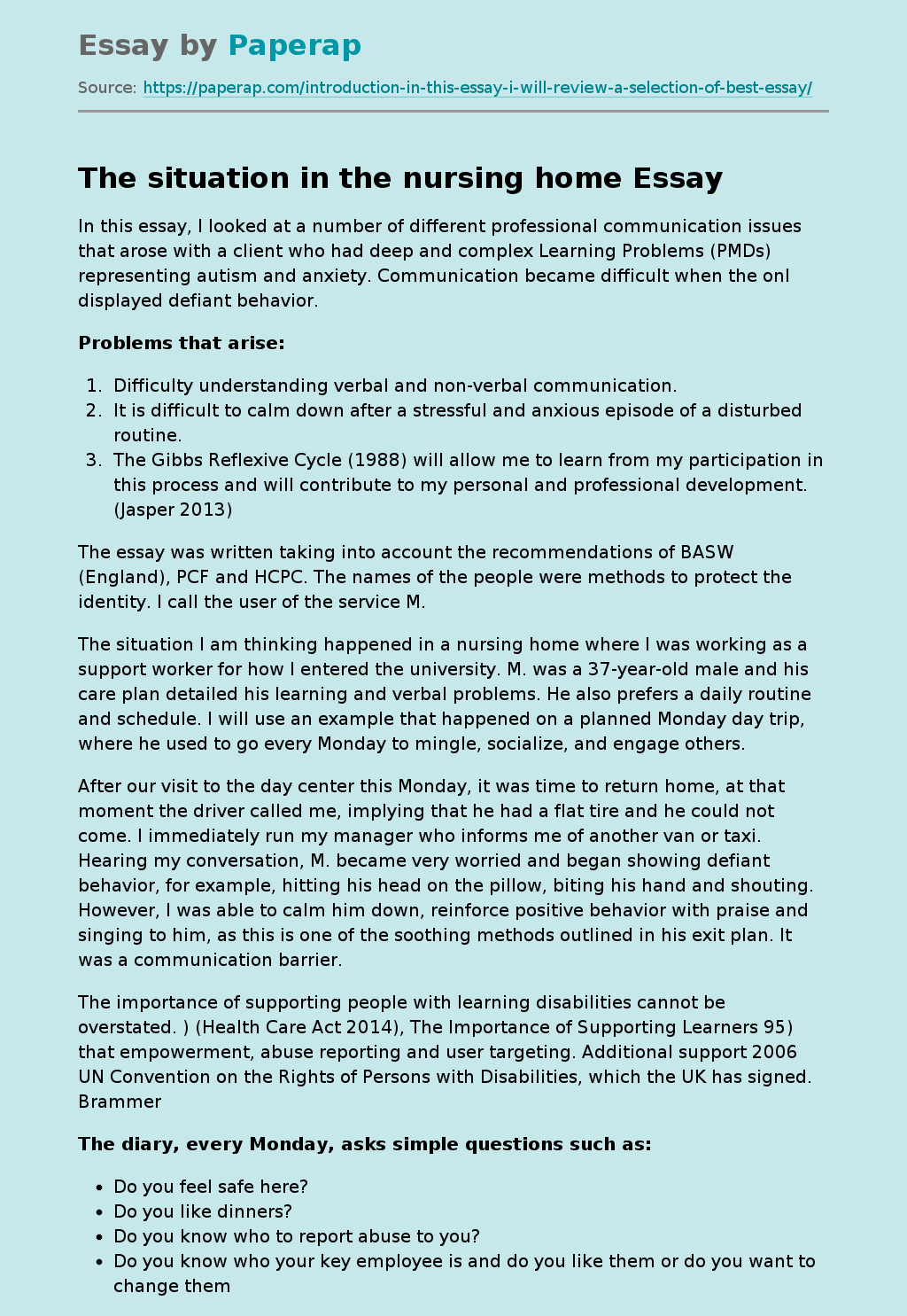The situation in the nursing home
In this essay, I looked at a number of different professional communication issues that arose with a client who had deep and complex Learning Problems (PMDs) representing autism and anxiety. Communication became difficult when the onl displayed defiant behavior.
Problems that arise:
- Difficulty understanding verbal and non-verbal communication.
- It is difficult to calm down after a stressful and anxious episode of a disturbed routine.
- The Gibbs Reflexive Cycle (1988) will allow me to learn from my participation in this process and will contribute to my personal and professional development.
(Jasper 2013)
The essay was written taking into account the recommendations of BASW (England), PCF and HCPC. The names of the people were methods to protect the identity. I call the user of the service M.
The situation I am thinking happened in a nursing home where I was working as a support worker for how I entered the university. M. was a 37-year-old male and his care plan detailed his learning and verbal problems.
He also prefers a daily routine and schedule. I will use an example that happened on a planned Monday day trip, where he used to go every Monday to mingle, socialize, and engage others.
After our visit to the day center this Monday, it was time to return home, at that moment the driver called me, implying that he had a flat tire and he could not come. I immediately run my manager who informs me of another van or taxi. Hearing my conversation, M. became very worried and began showing defiant behavior, for example, hitting his head on the pillow, biting his hand and shouting.
However, I was able to calm him down, reinforce positive behavior with praise and singing to him, as this is one of the soothing methods outlined in his exit plan. It was a communication barrier.
The importance of supporting people with learning disabilities cannot be overstated. ) (Health Care Act 2014), The Importance of Supporting Learners 95) that empowerment, abuse reporting and user targeting. Additional support 2006 UN Convention on the Rights of Persons with Disabilities, which the UK has signed. Brammer
The diary, every Monday, asks simple questions such as:
- Do you feel safe here?
- Do you like dinners?
- Do you know who to report abuse to you?
- Do you know who your key employee is and do you like them or do you want to change them?
The presence of such closed-ended questions only satisfies the staff tick box; on the contrary, it is actually a shame that while these questions are being asked to residents (Williams 2009: P111) of appalling statistics sites for adults with learning disabilities who witness physical abuse, a percentage of them are verbal abuse. and bullying (statistics on learning disabilities, www. Learningdisabilities .org. uk), and most clients with learning disabilities may well have other needs such as hearing and vision loss (Levy 1997, cited in Williams 2009: p. 39) that 60 percent of them will have sensory impairments, about 20 percent will have vision problems, not to mention direct visual impairments. eye avoidance syndrome.
So these meetings and questions are not how the client with learning disabilities wants to communicate their feelings, as in most cases they communicate by action.
Max was 69 years old and moved to a nursing home in accordance with (Nursing Act 2014 and Health and Welfare Act 2008). He loved to do things, loved the routine and had a preferred way of doing things – he clapped his hands to show that he wanted to go to the toilet, he cried. Max is really struggling and has no experience of negotiating or requesting change, when there is a conflict due to a change in routine, it is difficult for him to cope and instead will go to the atantra where he will need help to calm down.
For example, one morning we left the apartment building with Max and went to the day center on a specially adapted bus.
Max, I liked everything there, and at the end of the day we were going to return to the apartment building. We usually wait for the arrival of the bus in the lobby of the day center. It was usually around 4 pm. The bus usually arrived on time. However, on that day, the driver called me, who said that the specially adapted bus had broken down and he could not catch us in time. So I decided to take an alternative transport, using a wheelchair-accessible taxi.
For the purpose of informing the user of the service, my fellow trainee informed the user of the service of the changes. This was when I called the taxi service. Upon hearing about the change in plans, Max became extremely upset, agitated and anxious, and began to cry and make sounds. He started banging his head on a chair, biting his hands, because he was used to riding the bus and did not like to change his daily routine.
Knowing Max, I knew that he was trying to communicate to us by his behavior, and my colleague did not understand him, because she had just started working. Max looked very worried and angry. I managed to calm him down by convincingly explaining that everything would be fine and that I was working on an alternative way to get us home. He listened to me and calmed down, stopped biting his hand and swaying back and forth and waited. I knew that he was trying to communicate to us by his behavior, and my colleague did not understand him, because she was just starting to work.
I remember having mixed feelings throughout the incident. I think that although I persuaded M to calm down, I tried my best to intervene.
The situation in the nursing home. (2019, Nov 19). Retrieved from https://paperap.com/introduction-in-this-essay-i-will-review-a-selection-of-best-essay/

